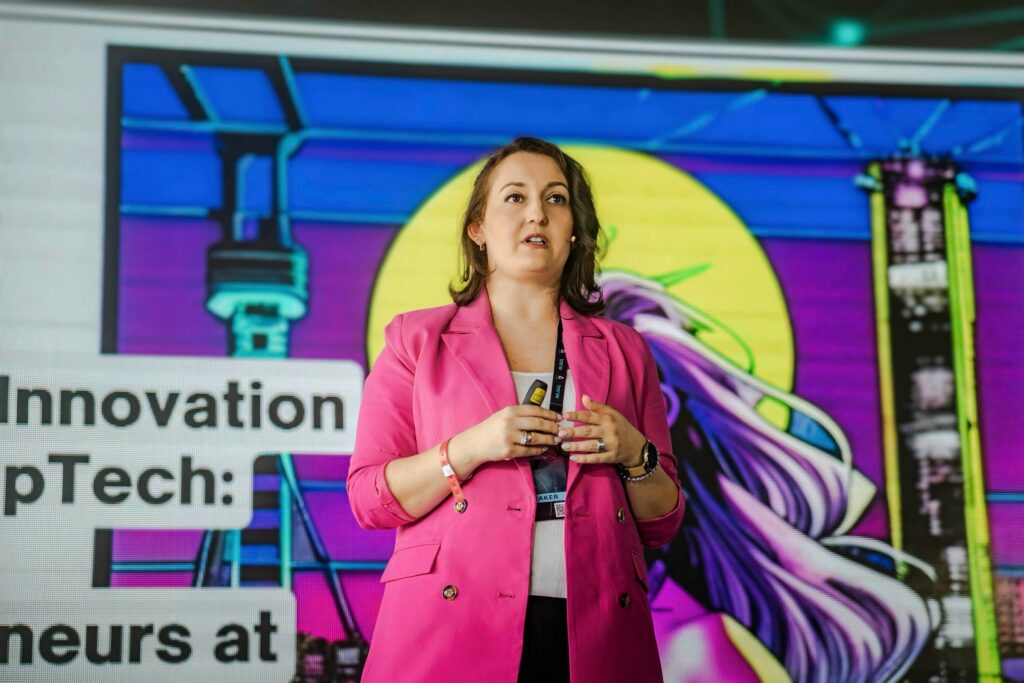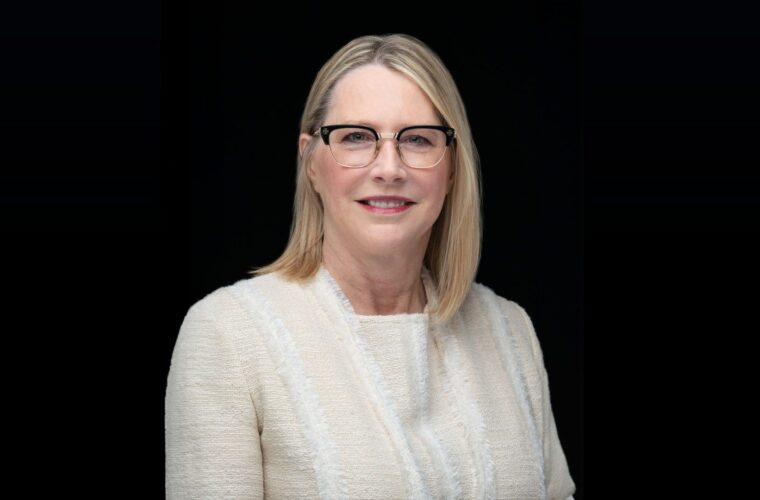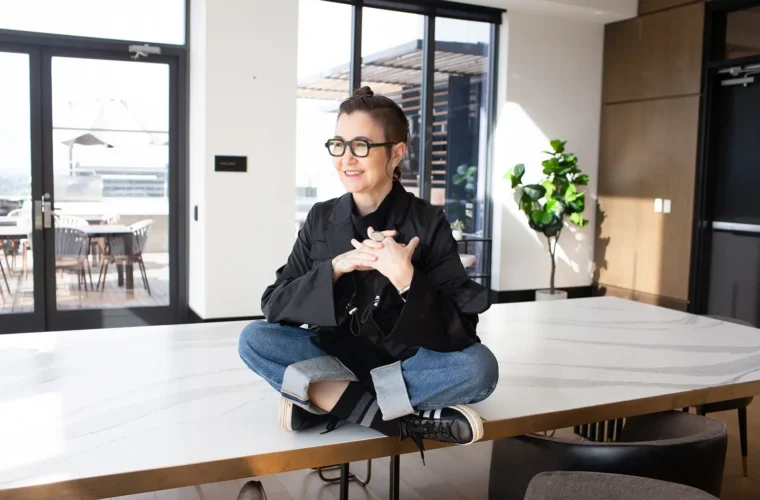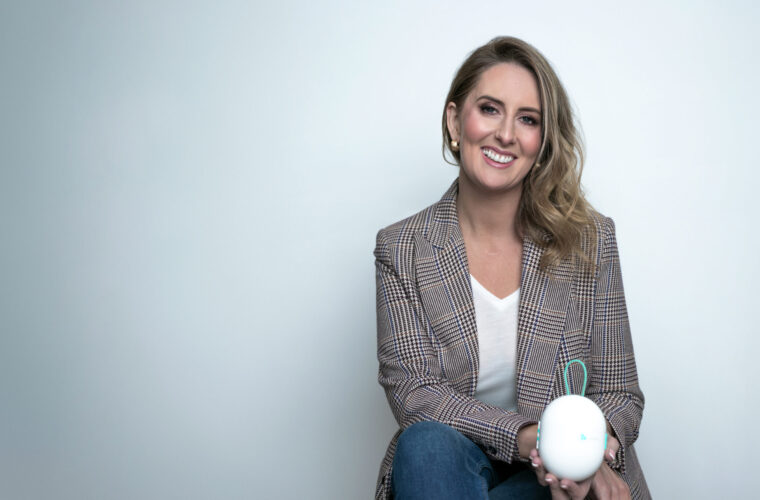In an industry often dominated by men, Paulina Chotrova is making waves as a passionate leader in technology, business, and advocacy for women’s empowerment. As the President of Women in DeepTech, Polly has dedicated her career to advancing innovation and sustainability while opening doors for women in tech. Her journey from engineering student to influential leader has been shaped by a drive to challenge the status quo and foster a more inclusive tech landscape.
In this interview, Paulina shares her inspiring journey, insights into the evolving role of women in tech, and her strategies for balancing multiple leadership roles. Our discussion explores the experiences and perspectives of a trailblazer dedicated to creating meaningful change across the deep tech, sustainability, and innovation sectors.
You have a wide-ranging career, from leading PSK Group to founding Women in DeepTech. Can you share the journey that led you to where you are today? What were some key moments or challenges that shaped your path?
My journey has been a combination of passion, vision, and a strong belief in creating positive change through technology and innovation. After completing my degree in Computer Engineering from TU Sofia, Plovdiv branch, I started my career in tech, where I quickly recognised the need for more women to take leadership roles in the industry. This realisation led me to establish Women in DeepTech, a non-profit organisation focused on promoting gender diversity and inclusion in deep tech fields. A significant moment in my journey was founding Women in DeepTech in April 2022. We focused heavily on R&D and collaboration with universities, research institutes, and tech ecosystems to drive innovation with a focus on gender equality. Along the way, I’ve faced challenges, including convincing others of the importance of gender diversity and navigating the male-dominated spaces of technology. However, these obstacles only fueled my determination to make a lasting impact. The recognition of my work at PSK Group, including the 40 under 40 award, was another turning point, reinforcing that positive change is possible, especially when backed by passion and vision.
As the Founder and President of Women in DeepTech, how do you see the role of gender diversity in the tech industry evolving? What are some of the most pressing challenges you are addressing through this initiative?
The tech industry has made great strides in recognising the importance of gender diversity, but there’s still much work to be done, particularly in R&D-driven sectors like AI and deep tech. Women in DeepTech focuses on filling that gap by connecting women with opportunities for mentorship and access to cutting-edge research. We are working to change the narrative by ensuring women are represented not just in tech but in R&D roles and leadership positions. A significant challenge we address is the underrepresentation of women in research and innovation. For example, many talented women in tech are often sidelined when it comes to leadership roles in R&D projects. Through collaborations with universities and research institutes, we provide women with the platform and support they need to lead high-impact projects in deep tech. Another challenge is closing the gender gap in AI and emerging technologies, where our focus is to ensure women are not just participants but leaders in shaping the future of these fields.
With your involvement in various leadership roles across tech, business, and sustainability, how do you balance your work between sectors?
Balancing multiple leadership roles across tech, business, and sustainability requires clear organisation, but it’s incredibly rewarding. At PSK Group, I lead strategic initiatives that combine technology with sustainable business practices, such as our AI-driven solutions that help businesses reduce energy consumption and improve efficiency. My work at Women in DeepTech complements this by focusing on the inclusion of women in deep tech and R&D. Managing these roles requires aligning my broader vision for change and staying organised. For example, the strategic partnerships we’ve built at Women in DeepTech with academic institutions help push forward innovation, which directly ties into the sustainability goals I champion at PSK Group. Through efficient time management and building strong, collaborative teams, I’m able to ensure that all sectors — business, sustainability, and gender diversity — are moving forward cohesively.


Women in DeepTech have been pivotal in supporting women in the industry. Could you share some success stories or moments that make you particularly proud of the impact your organisation has had?
There are numerous moments I’m incredibly proud of. One standout success story is the transformation of a mentee who came to us with little experience in R&D. After participating in our mentorship program and collaborating with academic institutions, she led a major AI research project in partnership with a university, contributing to significant advancements in healthcare. Her journey epitomises what Women in DeepTech stands for, enabling women to take the reins in leading high-impact projects. Another proud moment was when we hosted our first international meetup, which attracted women from across the globe to share their knowledge and network with industry leaders. The success of this event demonstrated the power of collaboration between tech ecosystems, research institutes, and our community. It also reinforced our focus on R&D and the essential role women can play in shaping technological advancements.
You’ve mentioned the importance of innovation, particularly in deep tech. How do you see the intersection of deep tech and sustainability evolving in the future, and how are you positioning your various organisations to lead in this space?
The intersection of deep tech and sustainability is increasingly important, especially as the world grapples with environmental challenges. Deep tech, particularly AI and blockchain, offers innovative solutions to drive sustainability efforts, from optimising energy consumption to improving waste management and creating smarter infrastructure. At Women in DeepTech, we are ensuring that women are at the forefront of these innovations by facilitating partnerships with research institutes and academic communities focused on sustainable tech. We’re developing AI-based systems for energy efficiency and waste reduction through these collaborations. At PSK Group, we’re integrating these technologies into our core operations, ensuring we lead by example in innovation and sustainability. I see deep tech as an opportunity for business growth and a powerful tool for environmental change. I’m committed to ensuring women are key players in driving that transformation.

As someone involved in mentoring and developing future talent through initiatives like Quant Foundation, what advice would you give to young women entering tech today? How can they best prepare for the challenges and opportunities that lie ahead?
I advise young women entering tech today to be bold and confident in their abilities. The tech industry is vast and full of opportunities, but it’s also one where women often feel underrepresented. Don’t shy away from leadership roles or high-impact projects, even if they initially seem intimidating. Seek mentorship, build a strong network, and make sure to stay curious — the tech world is constantly evolving, and learning new skills is key to staying ahead. At the Quant Foundation, we focus on both technical and leadership development, and I encourage young women to not only master the technical aspects of their field but also build strong leadership, communication, and problem-solving skills. Being a well-rounded leader in tech requires confidence, adaptability, and the ability to collaborate across teams. Women should be proactive in creating their opportunities, and through mentorship and community engagement, they can find the resources they need to succeed.
Your leadership at Women in DeepTech highlights the need for a more inclusive tech industry. What are some strategies or policies you believe companies should adopt to foster greater inclusion and diversity in tech spaces?
To foster greater inclusion and diversity, companies must prioritize creating inclusive cultures where all employees feel valued. One key strategy is implementing mentorship and sponsorship programs that connect women with senior leaders and give them access to high-impact projects. At Women in DeepTech, we’ve seen firsthand how these programs can accelerate career advancement and innovation. Companies should also implement clear policies for pay equity and establish pathways for women to move into leadership roles. Creating flexible work environments, such as remote work options and family-friendly policies, also helps ensure women have the support they need to thrive. Collaboration with academic institutions is another critical strategy. At Women in DeepTech, our partnerships with universities and research institutes help close the gender gap in R&D, ensuring women have access to resources and research opportunities. These efforts will help transform the industry into one that is truly inclusive.
Lastly, how do you see the future of Women in DeepTech and your other ventures unfolding over the next few years? What are your long-term goals, and what new projects or initiatives can we expect to see from you?
The future of Women in DeepTech is incredibly exciting. Over the next year, we plan to expand our R&D initiatives, forging even more collaborations with universities and research institutes to advance sustainable tech solutions. We will continue to develop and implement mentorship programs that help women lead high-impact research projects, contributing to groundbreaking innovations in AI, blockchain, and sustainability. My long-term goal is to ensure that women are not only part of the conversation in deep tech but are leading it. We’re also focusing on increasing our global reach, helping women from underrepresented regions access the resources, mentorship, and opportunities they need to excel in tech. I’m also excited about upcoming initiatives focused on the intersection of deep tech and social impact, where we can use technology to address pressing social issues like climate change and inequality. With ongoing growth and a strong focus on R&D, Women in DeepTech will continue to be a trailblazer in creating a more inclusive and innovative tech industry.



